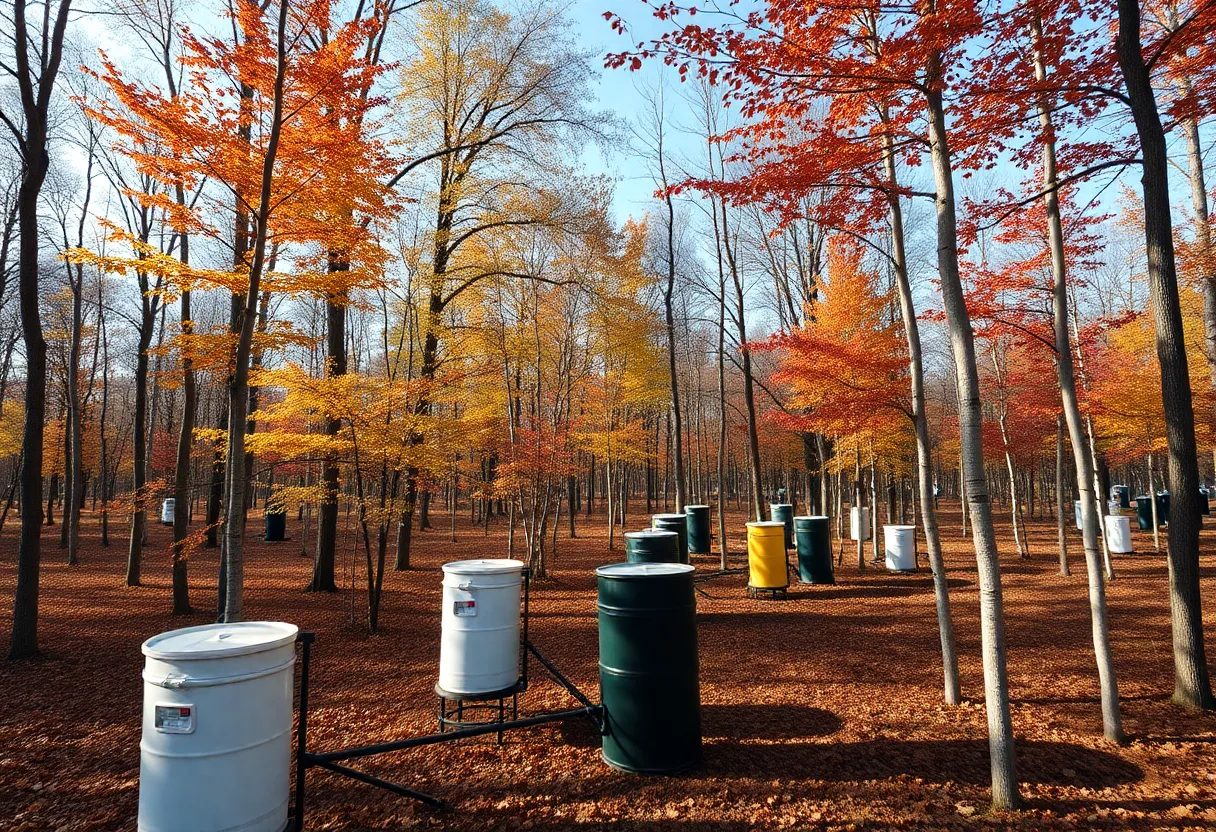News Summary
A recent University of Kentucky study reveals the state could tap into a $25 million maple syrup industry, creating over 1,300 jobs and generating $1.6 million in tax revenues. The research indicates that with favorable conditions and suitable maple tree resources, Kentucky could emerge as a new hotspot for maple syrup production. Various organizations are set to offer training to support this growing sector, highlighting opportunities within local economies for sustainable agricultural practices.
Lexington, Kentucky – A recent study from the University of Kentucky reveals significant economic potential for maple syrup production in the state, estimating an annual circulation of up to $25 million once fully developed. The research highlights that this nascent industry could create over 1,300 jobs and generate approximately $1.6 million in tax revenues.
The study, titled “Economic impacts of maple syrup production potential in Kentucky: Input-output analysis,” was published in the journal Forest Policy and Economics. The findings suggest that with favorable environmental conditions and the presence of millions of acres of suitable untapped maple trees, Kentucky stands at the southern edge of traditional maple syrup regions, poised for growth in this sector.
Researchers assessed various production scenarios—low, medium, and high—using sophisticated economic modeling that took into account factors such as tree density, sap yield, tapping season length, and market prices. In a high production scenario, the teams estimate that Kentucky could produce around 1.4 million liters of syrup each year, providing benefits not only to syrup producers but also to suppliers and retailers.
Economic Impacts
Even if only a quarter of suitable trees were tapped, it could support over 300 jobs and generate an economic output of $6.2 million. The sustainable nature of maple syrup production allows landowners to maintain forest cover while still generating income, creating a viable financial opportunity that aligns with environmental conservation efforts.
The U.S. maple syrup market is currently valued at over $150 million annually, with a noticeable rise in consumer demand for natural, locally produced foods. Kentucky’s positioning in the lower Midwest and South presents a unique market opportunity where demand for maple syrup is currently outpacing supply. As local economies seek to promote self-reliance in syrup production, it also holds prospects for enhancing agritourism.
Challenges and Training Opportunities
The study does address potential challenges related to climate conditions, reassuring stakeholders that Kentucky is still conducive to maple syrup production. To further support the development of this industry, various organizations plan to host workshops and training sessions aimed at educating potential producers on tree identification, tapping techniques, equipment efficiency, and marketing strategies.
In addition, further research will delve into production cost estimates, development of value-added products, and the long-term health of forests under sustained tapping practices. The collaborative effort among researchers from the University of Kentucky, Purdue University, and the U.S. Forest Service provides a strong foundation for this emerging industry.
Community Engagement
The study also emphasizes the importance of community discussions and policy considerations. By embracing maple syrup production, Kentucky could not only reap economic benefits but also enhance broader environmental objectives. The potential for job creation, increased tax revenues, and sustainable agricultural practices presents an appealing opportunity for stakeholders as the state looks to develop its natural resources.
In conclusion, the study advocates for a concerted effort among policymakers, researchers, and local communities to explore and harness Kentucky’s maple syrup production potential, paving the way for economic growth and sustainability in the years to come.
Deeper Dive: News & Info About This Topic
HERE Resources
Additional Resources

Author: STAFF HERE LEXINGTON KY STAFF
The LEXINGTON STAFF WRITER represents the experienced team at HERELexingtonKY.com, your go-to source for actionable local news and information in Lexington, Fayette County, and beyond. Specializing in "news you can use," we cover essential topics like product reviews for personal and business needs, local business directories, politics, real estate trends, neighborhood insights, and state news affecting the area—with deep expertise drawn from years of dedicated reporting and strong community input, including local press releases and business updates. We deliver top reporting on high-value events such as Woodland Art Fair, Crave Food and Music Festival, and Railbird Festival. Our coverage extends to key organizations like Commerce Lexington and Blue Grass Community Foundation, plus leading businesses in education, manufacturing, and technology that power the local economy such as University of Kentucky, Toyota Motor Manufacturing, and Lexmark. As part of the broader HERE network, including HEREBowlingGreen.com and HERELouisville.com, we provide comprehensive, credible insights into Kentucky's dynamic landscape.





